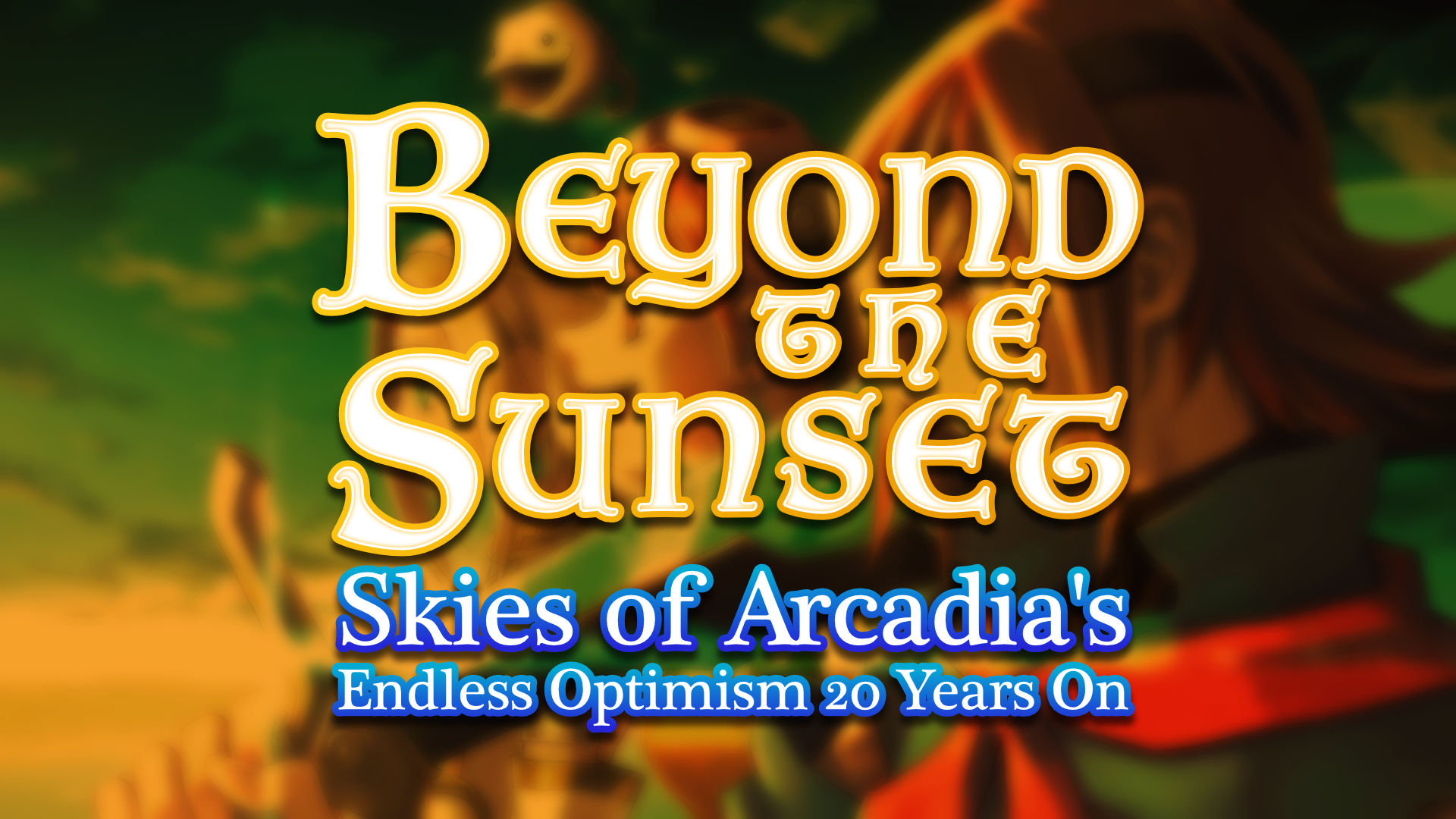This article contains mild spoilers for Skies of Arcadia.
There’s a scene early on in SEGA’s cult classic RPG Skies of Arcadia that’s always stuck with me. After rescuing the mysterious girl Fina from the clutches of the Valuan Armada (an empire that’s looking to rule the world with an iron fist), the two plucky heroes Vyse and Aika join their newly-rescued friend at the highest point of their home, Pirate Isle. Together, the three of them look out at the endless sea of clouds, tinged with a warm glow as the sun sets. Fina, a sheltered descendent of an ancient civilisation called Silvites, is mesmerised by its beauty. Vyse agrees with her, and starts an impassioned speech with these words as he stares out towards the sky:
“When I’m up here, I often wonder what lies beyond the sky… Beyond the sunset…”
This scene—and this speech in particular—summarises so much about Vyse, and about Skies of Arcadia to me. The limitless potential of exploration; the passion of dreams and the power of acting upon them; the confidence to do anything you want to do; and most importantly, being optimistic. Monsters and maelstroms may lie beyond the sunset, but Vyse isn’t willing to give up. He will go beyond that sunset. Whatever that means. How can you go beyond the sun, the sky?
It’s this tone and thirst for adventure that’s helped make Skies of Arcadia so endearing to so many. The world invites you to scratch at every single surface and pore over every single speck of airspace. As a kid, this was the reason I played Skies of Arcadia: to lose myself in what is my favourite RPG world, and to gain some kind of confidence by finding the tiniest discovery. The game celebrates its 20th anniversary in Japan on October 5th, 2020, and it seems almost criminal that besides a GameCube rerelease in 2003 and a few cameos in other games like Valkyria Chronicles, Vyse, Aika, and the Blue Rogues are stuck in the past. So many of us want to rediscover the world of Arcadia, to feel that passion for exploration that has barely been matched since. It’s what makes this game so memorable to those who’ve played it, and so sought after by those who have never had the chance. But there’s something more important to me now about Skies of Arcadia that as an adult I value so much, that cements it as a special game to me: its optimism.
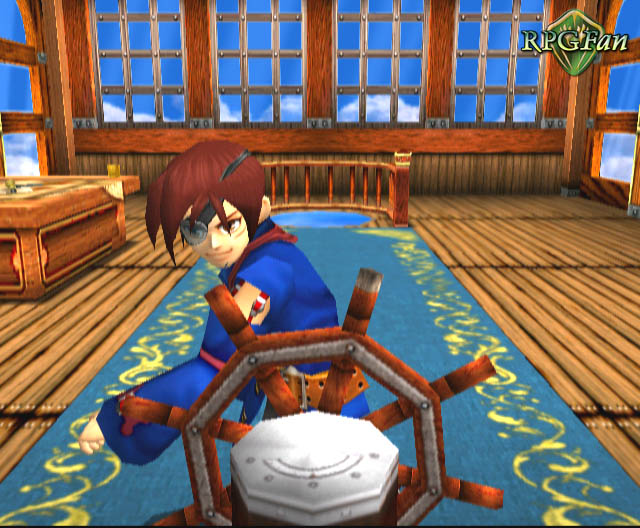
When the game first came out, it stood out against its contemporaries like Grandia II, Final Fantasy VII, and Xenogears for its bright, cheerful tone and colourful world. It was a ray of sunshine in an age where RPGs were looking to explore much more serious topics (which rightfully needed to be explored), and in many ways, it still is. It was a breath of fresh air watching Skies of Arcadia‘s opening cinematic, seeing this exciting world before your very eyes. There’s a real thrill watching the Blue Rogues cheer as Vyse spins the ship’s wheel, or as the cannons hit a rival ship in combat, and this sense of wonder carries throughout the game.
Dismissing the pure joy that is uncovering Arcadia’s secrets would be criminal. A world which is entirely floating islands and continents spread across a vast cerulean sea of clouds and rifts. Exploring and seeing how communities have struggled, grown, and thrived to create their perfect home, to protect their culture, is a sight to behold. Arcadia really does take your breath away, even 20 years later. Even in the darker corners such as the Dark Rift or the South Ocean, the thrill of success—and the feeling that you’ve overcome the odds—and seeing Vyse and his crew celebrate together as a team, fills you with happiness. Skies of Arcadia has the ability to tap into a childlike sense of wonder and optimism like nothing else. We’re just like Vyse, sailing beyond the sunset to discover a magical world, doing the things that make us feel happy.
Using positivity as a way of empowering ourselves is key to Skies of Arcadia, and no character better embodies this than the lead hero, Vyse. Like your typical noble thief, Vyse is cocky and self-assured, but not to a point where he’s annoying. There’s something very enchanting about watching this overconfident air pirate smirk at a group of Valuan troops as they surround him. He has the gall to tell them exactly what he’s there to do: steal their valuables. And like any noble thief, he and the Blue Rogues “Rob from the rich and keep the gold. But, we use the gold to save people that need our help.” He says this proudly to Fina after rescuing her, again with that trademark smirk. It’s that Robin Hood attitude we’re so used to seeing in fiction; he desires to outdo everyone and make a name for himself, but he also never loses sight of his friends and their happiness in the process.
When Vyse listens to Aika’s or Fina’s worries and either teases them (mostly reserved for Aika) or comforts them, it’s never about exposing them or making them feel uncomfortable. It’s about empowering them, to help them do what’s right for them. He comforts Fina as she finds out the truth about her ancestry, and he lets her make the decision on whether she should confront the Silvite Elders. And while Vyse will pick on Aika for her fear of ghosts, he’s always there to make sure she’s alright. This tight-knit unit, who laugh and cry together, who protect each other and make each other smile, are such a strong core. I have a fondness for Fina as she laughs at Aika’s crazy dreams about treasure, and how, despite his cockiness, Vyse can soften up at the sight of his friends in pain. Even in the face of danger, these three come together to overcome anything.
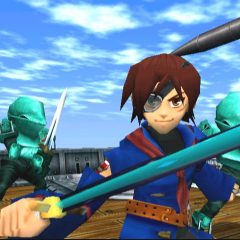
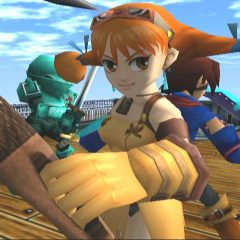
Specifically, it’s the way that Vyse laughs in the face of danger that is so infectious, both to me and the other characters, and it’s when Vyse is up against the odds that his optimism truly shines through. While curious about the world around him (sometimes to a fault), he relishes a challenge, all while saving his crew and the world in the process. When saving his father and the rest of the Blue Rogues from execution at the colosseum in Valua, he makes a show of it with no sense of fear in his eyes, and that smirk that you get oh-so familiar with makes another appearance. I can’t help but laugh as he ends his speech to the Executioner with a “By the way, the name’s Vyse!” or as he laps up the applause after saving his friends in front of the Valuan citizens.
Even when personal tragedy hits, and Vyse is separated from Aika, Fina, and mentor figure/grumpy fisherman Drachma, he doesn’t lose that spark of life. Shipwrecked on an island alone, with barely any food, Vyse could easily give up, but he doesn’t. He lets his desire for more, the thoughts of his friends, and his dreams, give him the will he needs to survive. Aika and Fina, who were rescued together, look at that same moon and wonder after him, but they don’t get downhearted. They have their moment to worry, but they have the courage to overcome that worry and act. The girls are constantly trying to boost themselves as they gather the funds together to find their friend, and maybe some treasure on the way.
Positive and uplifting language is laced all throughout Skies of Arcadia, so much so that you could probably write an entire motivational speech consisting entirely of quotes from this game. One of the best is when Vyse tells a young homeless boy, Marco, that he’s going to escape from the Grand Fortress. The boy tells him it’s impossible, which ticks Vyse off. “Impossible is just a word to let people feel good about themselves when they quit.” he says. He tells Marco that he believes in himself, and will never give up, that impossible just means another challenge to the young air pirate, inspiring confidence in Marco. It’s a really beautiful moment, one which causes the boy to cry. Inspired by the Blue Rogue, Marco later becomes your first crew member.
Vyse has to give more tough love later on when he is the captain of his own ship, the Delphinus, and they arrive at the abandoned border town of Esparanza (the correct spelling of “esperanza” ironically meaning “hope” in Spanish). In this town, once-optimistic and daring sailors settle to wallow in pity, after failing to achieve their dreams. While visiting the rusted town, Vyse and Aika walk into a tavern where they meet Don and a group of forlorn pirates to try and find a way to pass through the Dark Rift (think the Bermuda Triangle). The men just laugh at the youngsters and try to discourage them. Aika is ready to leave, but Vyse is ready to get the last word in: he thanks them, calls the men pitiful, but doesn’t leave them with the satisfaction of wallowing in their own misery. He tells them “If you lose sight of one dream, replace it with another.” Vyse hates it when people give up, but just like with Marco and his other friends, he refuses to kick them while they’re down. He’s trying to draw something out of the former sailors, a desire and a hope that they once had. Don is left speechless, and Vyse and Aika leave the tavern. They return the next day, and Don succumbs to Vyse’s confidence. The captain of the Delphinus promises to come back, to prove that he survives the Dark Rift. When he does, hours of game time later, it’s not surprising that an inspired Don joins your crew.
There is one single moment where Vyse is almost ready to give up, and you can see the anguish on his face as he says “Damn! There’s nothing we can do!”, but Enrique—who himself has grown from the unconfident and inexperienced young prince of Valua to a brave and respectful hero—tells his friend and comrade “I leave you guys alone for a few days, and you’re ready to surrender?” Vyse is the reason characters like Enrique, Drachma, Marco, and Don all experience their moments of growth and can move forward. He stands as an inspiration to so many throughout the game, which is so poignant. All of the uplifting that he and his crew have done is returned to him, to give him the hope and the energy to save the world.
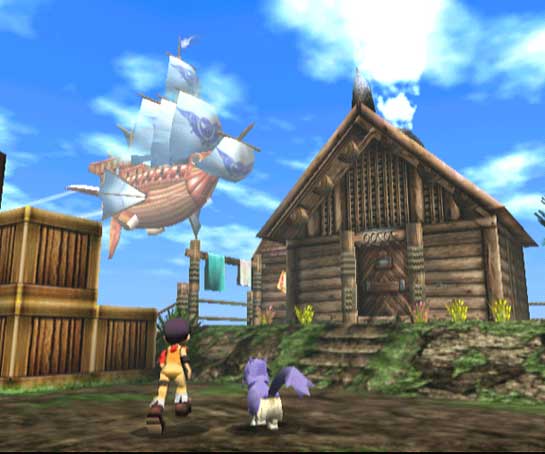
It’s just as important to look at the camaraderie that the crew mates have built up throughout the game. Just having a team of people to work on your ship as you go out exploring gives you a new Super Move, where everyone bands together to attack, buff, and heal your enemies and party respectively. Recruiting many of your crew involves proving your own worth, reuniting families, or simply granting someone’s wishes. Talking to them on the Delphinus shows that they’re happy just being there, and they react to different situations. But it’s when you start building your base that these characters come alive.
Crescent Island is a really special act of reclamation in Skies of Arcadia, because it’s Vyse taking back the island he was shipwrecked on and turning it into his own base. His crew mates thrive on this island, and help shape it into a new home for them and for Vyse. From allowing you to change the fountain and some building aesthetics, to having positive interactions with your crew, there’s nothing better than watching the base grow and evolve, and become more alive with additional people. It feels symbolic of the growth so many characters experience throughout the game, and becomes a beacon of hope and happiness for many.
So much so, that when it gets destroyed, everyone bands together to help rebuild it. Despite aching backs, ruined buildings, and injuries, everyone is helping each other out, doing things that they wouldn’t normally do. They’re doing this because the Blue Rogues are a family, and they will not give in to the demands of the Empire. There is a particular moment I like here, where Fina—unable to face the destruction—walks out onto the balcony. Even though she’s gripped by sadness, anger, and fear, she watches her friends attempt to clear the island with a smile. Their motivation inspires her.
I’ve tried so often to capture Skies of Arcadia‘s optimism in a bottle for myself. It radiates a warmth and positivity from every pixel and polygon that I’ve yet to find in any other game. It never puts its heroes, or those who are suffering, down. It wants you to overthrow the Empire and challenge those in power. But it wants you to do all of this with a smile on your face. And if you’re ever struggling, it’s there to remind you that your friends are there to uplift you. The game ends on a hopeful and optimistic note in an attempt to inspire the player:
“A young boy had a dream. A young girl had passion. A mysterious stranger had a mission. And the world will forever know their story. As long as there are dreamers who have the courage to pursue their dreams, the world will have heroes. And as long as there is a thirst to discover the unknown, there will be new stories to tell…and new adventures to be had.”
Dreams, passion, courage, heroes. All things we aspire to be or have. All things that make us feel good. Optimistic. Vyse managed to sail beyond the sunset and achieve his goals, but that doesn’t mean that no one else can follow suit. It absolutely inspires a sense of adventure and exploration, but it’s surely the thrill of acting on your dream, of achieving something, no matter how big or small, that gives us a boost. That allows us to feel that little bit of optimism.
Just as much as Skies of Arcadia is about the magic of exploration, it’s also about doing things with a smile on your face, and doing what makes you happy. So whatever that goal, that sunset is, I will see what lies beyond it eventually.
And hopefully a remaster too.

